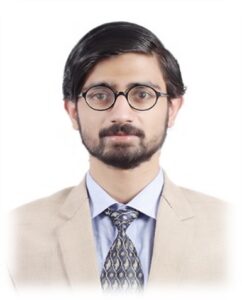 Dr. Siddharth Raina is a 2020 Khorana Program alumnus and a medical graduate from the All India Institute of Medical Sciences (AIIMS), Bhopal, India. He is passionate about Psychiatric medicine and wants to contribute to translational research. In this blog Siddharth shares his unique experience of a virtual research internship during the COVID-19 pandemic and how it influenced his career choices.
Dr. Siddharth Raina is a 2020 Khorana Program alumnus and a medical graduate from the All India Institute of Medical Sciences (AIIMS), Bhopal, India. He is passionate about Psychiatric medicine and wants to contribute to translational research. In this blog Siddharth shares his unique experience of a virtual research internship during the COVID-19 pandemic and how it influenced his career choices.
Siddharth was introduced to the human mind early on in life by his mother, who was a graduate in Psychology. They had old Psychology textbooks in the house, and she frequently talked about the interesting facets of human behaviour and about the prominent scientists who shaped the field. Even though Siddharth found this domain fascinating, he wanted to experiment and explore different areas before finalizing his education and career path.
“I was always very inquisitive and never really restricted my field of study. So I kept talking to people, attended workshops and learned things that I thought might be relevant for me.”
Now he is a graduate in medicine with research experience in areas ranging from infectious and animal diseases, to nanoparticles and biomaterials. He has also worked as a research intern in different institutes and organizations like IIT Kharagpur, SRISTI innovations, Central Drug Research Institute, AIIMS Bhopal and Delhi in India. It took a while for Siddharth to discover his true passion. His first year of medical school was challenging but things got better in the second year when he was inspired by the dedicated residents in the obstetrics and gynaecology unit. They helped him realise that he wanted to improve the lives of patients, and translational research would be a way to achieve this goal.
“Be it dressing a wound or consoling a crying baby, patient care is the best part of clinical sciences. The most prized feelings [for a medical professional] are those when we have made someone’s life a little better.”
In 2019, a senior from college told Siddharth about the Khorana summer internship program. Even though his hands were full with research projects and clinical postings, the opportunity to explore a different area of research, convinced him to apply. Siddharth was selected for the program and would have travelled to the US in the summer of 2020, but the COVID-19 pandemic disrupted these plans. Domestic lockdowns and global travel restrictions meant that the internship would be virtual for the first time ever.
Siddharth worked with Dr. Albert Powers lab at Yale University and developed computational models to better understand Psychotic disorders. Psychotic disease is an umbrella term for disorders that cause disturbances in perception, like seeing, hearing or feeling things that do not exist. He was involved in analysing data from animal and human studies using intricate algorithms to facilitate early detection and treatment.
Working remotely and in a different time zone can be isolating. Siddharth also learned to code all by himself. The unique setup of a virtual internship was challenging in the initial days, but Siddharth looked forward to the weekly discussions and progress meetings.
“All of my previous internship experiences were wet lab and performing experiments is not just work but a very effective way to socialize. [In a virtual setting] most of my time was spent in reviewing literature, learning basic coding and testing hypothesis. Socializing was limited to lab meetings, but my colleagues were helpful and I could be reach out whenever I needed.”
He appreciated the work culture of the Power’s group and his colleagues were approachable and helpful despite limited opportunities to interact. He also found the organizers of this unprecedented online Khorana program encouraging and positive. But most importantly, working on Psychotic disorders during this internship motivated Siddharth to specialize in Psychiatry.
The second wave of the pandemic hit India when Siddharth started his medical internship in the ICU ward. He witnessed a large influx of cases with insufficient medical personnel and facilities to attend to them. He got a unique opportunity to learn rare and advanced techniques of patient care, but at the same time it was painful to witness the toll of the pandemic on patients and medical professionals.
“We all have our challenges [and] conventional wisdom says it’s better to focus on things that you have. This understanding really helps you to keep moving forward”
Siddharth found that patients suffering from depression and anxiety disorders were frequently misdiagnosed by doctors who were overworked and burnt out. According to him, Psychiatry can be a perplexing field and not suitable for everyone. He recommends spending time with patients, care givers and mental health professionals to make an informed choice about pursing this field. The mental health crisis during the pandemic further reinforced Siddharth’s decision to pursue Psychiatry and work in translational research to positively impact patients with psychiatric diseases. Through unique and challenging experiences Siddharth found his way back to his early fascinations with the human mind. If you would like to know more about Siddharth and his work, connect with him on LinkedIn!
Written by: Kadambari Vijay Sai
Edited by: Sneha Das